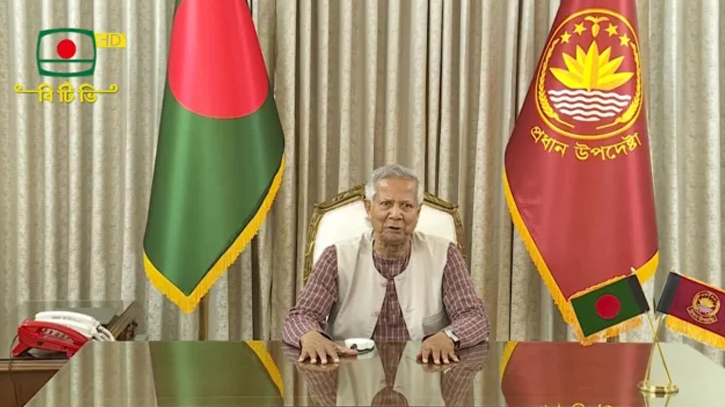
Photo: Collected
Chief Adviser Dr Muhammad Yunus has announced that the interim government has taken steps to form six commissions to overhaul in six key sectors, including the electoral system, in a bid to reform Bangladesh.
He called upon people from all walks of life to bring about reforms in their respective spheres, marking the first month of the interim government's formation in a national address.
In his televised speech on Wednesday night, he said: "We want reform. Our earnest request is that you do not retreat to the spectators’ gallery after entrusting us with the heavy responsibility of reform. Stay with us. We will reform together. This is a responsibility for all of us. Bring reform in your own world. A nation’s reform cannot only be the government’s reform."
Referring to the historic July uprising of students, workers, and the masses and the fall of the fascist government in Bangladesh at the cost of thousands of lives, Dr Yunus said that an unprecedented time and opportunity have arisen to implement the message and aspirations of this uprising.
He stressed that, in order to prevent the recurrence of fascism or authoritarian rule in Bangladesh and to establish a people-owned, welfare-oriented, and public-interest-driven state system, some national reforms are urgently needed. A central focus of these reforms is to ensure the establishment of a fair electoral system and good governance.
He said: "Reforming the police administration, public administration, judiciary, and Anti-Corruption Commission, along with the Election Commission, is essential for a free and fair election. I believe these reforms will also contribute to establishing a people-owned, accountable, and welfare-oriented state system."
Announcing the formation of six commissions as a primary step toward these reforms, Dr Yunus said: "We have initially decided to form six commissions. Six prominent citizens, selected for their expertise in specific areas, will lead these commissions. Dr Badiul Alam Majumdar will head the Electoral System Reform Commission, Mr Sarfaraz Chowdhury will lead the Police Administration Reform Commission, Justice Shah Abu Naim Mominur Rahman will oversee the Judicial Reform Commission, Dr Iftekharuzzaman will lead the Anti-Corruption Reform Commission, Abdul Muid Chowdhury will head the Public Administration Reform Commission, and Dr Shahdeen Malik will be in charge of the Constitutional Reform Commission."
The chief adviser further explained that the remaining members of these commissions will be decided in consultation with the respective heads.
Members of the advisory council, representatives of the student-worker-public movement, civil society, and political parties will participate in the discussions and consultations of these commissions.
Expressing hope that these commissions will formally begin their work on October 1, Dr Yunus said: "We expect the commissions to complete their work within the next three months. Based on their reports, the government will organize consultative meetings with the major political parties. Ultimately, a three-to-seven-day broad-based consultative meeting, involving representatives from the student community, civil society, political parties, and the government, will finalize the framework for the reforms. This will also provide a blueprint for the implementation of these reforms."
He expressed optimism, saying: "We believe that this initiative, united by the urgency to implement the message of the July uprising and rebuild the state, will strengthen and inspire the entire nation."
Referring to discussions with political parties and various stakeholders, Dr Yunus said: "Over the past month, I have met with several political parties separately and exchanged views. They have encouraged us and expressed support for the goals of the student-worker-public revolution. They have assured full cooperation in the reform process. I have also consulted with prominent editors, who have provided valuable advice and assured full support. Now it’s time for us to move forward with everyone’s suggestions. I have also met with prominent business leaders and explained the government's goals to them. They too have expressed agreement with our goals."
Mentioning that the core aim of the reforms is to ensure equal rights for all, Dr Yunus said: "We have a lot of work ahead of us. We want to move forward together toward the same goal. We want to create a structure that enables the untapped talents within us, especially within our new generation, to be expressed without obstacles, with the support of the state and society. Together, we want to ensure equal rights for every member of our family, whether they are a sweeper, a student, a teacher, or of any religion. That is the core goal of our reforms. Let’s quickly realize the goals of the student-worker-public revolution."
Speaking about the government's work during its first month, Dr Yunus said: "In the first month, we may not have been able to move forward with the pace and enthusiasm we had envisioned, due to real-world circumstances. If the law and order situation remains stable, I hope we will be able to accelerate our pace. For this, I seek the cooperation of all the people in the country—teachers, students, farmers, workers, professionals, large and small business owners, day laborers, housewives."
Seeking everyone’s support, he said: "Our work is very difficult, but as a nation, we cannot afford to fail this time. We must succeed, and this success will come because of you, because of your cooperation. Our job is to make our collective dreams a reality. As we enter our second month, we will strive to instill strong confidence in you."
Concluding his address, Dr Yunus said: "I won’t tell you to be patient. We are all impatient, wondering when all this work will be finished. We will be impatient. Why not? But we will work correctly. We will leave no trace of impatience in our work."
In his speech, Dr Yunus also outlined the government's plans for various sectors and, at the beginning, paid deep respects to all those who were martyred, injured, or lost their sight during the July-August uprising against fascism, for standing like the Himalayas in the face of fascist forces and embracing death to protest injustice.
Messenger/Shahed








